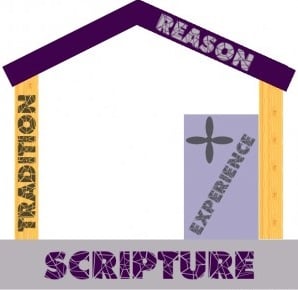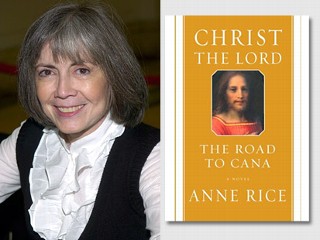We’re discussing how we build our knowledge of God, our theology, and using Wesley’s Quadrilateral (Scripture, Tradition, Reason and Experience) as an outline for our discussion. Last time we looked at Tradition with some wonderful discussion; today’s topic is the role of Reason in how we build our theology. Each of these topics overwhelms me in their significance and breadth; I look forward to the perspectives of others as we approach each of these rather large topics. As we look today at the role of Reason in our faith, think about these questions, again, both descriptively and prescriptively:
On Reason’s strengths: How have you most memorably and helpfully employed reason as you sought to understand or explain our Triune God and his work, or even his particular stance or hopes toward you or a loved one? How has reason most helped you relationally with God? With others? How has Reason worked to integrate your Experience with the Scriptures and Tradition for you?
On Reason’s limits: Of what practical importance are the parts of our knowledge of/relationship with God which go beyond language, let alone our capacity to reason? How do you nurture these aspects of your theology where reason is at best second or third fiddle without being dismissive of Reason? The biblical concept of “knowledge” is akin to the holistic “knowledge” of one spouse in relation to another. Has your “knowledge” of God been too intellectual or not intellectual enough? Does your camp under or over-value reason? How so? Has too great an emphasis on Reason ever hurt your faith? How so? Do you draw more strength or frustration from apocalyptic or poetic imagery? Or from Jesus’ parables and more cryptic sayings? Or from trans-rational practices such as praying in tongues? In what ways, if any, have you seen your own reason mislead you?
This intro from United Methodist
Church deserves slow, careful attention:
“[O]ur own careful use of reason,
though not exactly a direct source of Christian belief, is a necessary tool. .
. . Although we recognize that God’s revelation and our experiences of God’s
grace continually surpass the scope of human language and reason, we also
believe that any disciplined theological work calls for the careful use of
reason. By reason we read and interpret Scripture. By reason we determine
whether our Christian witness is clear. By reason we ask questions of faith and
seek to understand God’s action and will. By reason we organize the understandings
that compose our witness and render them internally coherent. By reason we test
the congruence of our witness to the biblical testimony and to the traditions
that mediate that testimony to us. By reason we relate our witness to the full
range of human knowledge, experience, and service.
“Since
all truth is from God, efforts to discern the connections between revelation
and reason, faith and science, grace and nature, are useful endeavors in
developing credible and communicable doctrine. We seek nothing less than a
total view of reality that is decisively informed by the promises and
imperatives of the Christian gospel, though we know well that such an attempt
will always be marred by the limits and distortions characteristic of human
knowledge.”
Descriptively, it is easy enough to admit,
with the summary above, that Reason is a necessary tool for building our
theology. It’s the prescriptive
role that is far more difficult to nail down. As we consider its prescriptive
role, we must acknowledge that we live squarely in an Age of Reason (often
employed or heralded over and against faith or revelation). It is more than mother’s milk for us
westerners, it’s more like oxygen. We all enjoy Reason’s many blessings and
curses. Even if the gospel of Reason
has begun to lose a bit of its shine for a few, it’s still making thousands of
converts every day around the world, with every medical advance, every new
weapon we invent, and even every new gadget from Apple. Modernism might have a couple of grey
hairs, that so called post-moderns have pointed out, but it’s far from dead or
even weak. Western rationalism
(which turns Reason from a tool into
the only tool for knowledge), along
with naturalism and its many siblings that often walk close behind, continues
to push for greater paradigmatic supremacy around the world in all facets of
thought and evaluation, whether governmental, philosophical, ethical, and even religious. In terms of philosophies of thought, it
is the juggernaut of our time.
And as for me personally, I am a lawyer by training and practice. Reasoning is the core activity of my
profession, and arguably my chief hobby as well. But I frequently tell folks, intelligence is far from the
greatest gift or virtue in God’s kingdom. Like many Christians
today and in generations past (even writers of scripture), I have mixed
feelings about Reason’s proper role in my faith, as wonderful and necessary as
it is.
And the scriptures, too, invite us to think
critically in the one hand, but also tell us to limit our confidence in our
reasoning. Like Tradition/community,
it is impossible and unwise to leave Reason out of our theological task. We are thinking creatures by God’s
grace and intent. Even the
Scriptures do us no good apart from our ability to think and understand. But consider some of these scriptures,
some of which have been more embedded in my mind than others:
Proverbs, a
book arguably more dedicated to reason than any in the Scriptures, tells us to
“Trust in the Lord with all your heart and lean not on your own
understanding.” Paul,
considered by even modern atheists to be an obviously brilliant man says to the
Corinthians, “My speech and my proclamation were not with persuasive words
of wisdom, but with a demonstration of the Spirit and power, so that your faith
might not be based on men’s wisdom but on God’s power.” How many of our preachers or
missionaries would ever say such a thing today? And even Jesus has this surprising bit of thanks: “I
praise You, Father, Lord of heaven and earth, because You have hidden these
things from the wise and learned and revealed them to infants. Yes, Father,
because this was Your good pleasure.” Why was this chosen and enjoyed by the same God who gave
intelligence? And even Tradition
gives mixed reviews of Reason. Luther, who once called Reason “the devil’s
whore,” modeled brilliance of reasoning. Where would the reformation be without Reason? And at the same time, from the Fall to
Satan’s temptations of Christ, to the present day, clearly the Holy Spirit is
not the only spirit who appeals to our reason as a way to tempt us. How
do we faithfully integrate these scriptures, examples and warnings and many
others like them into our use and evaluation of our own reason, yet sill love
God with all of our mind in a truly holistic way?


